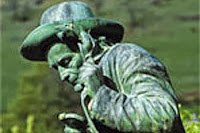In the U.S. and many high-tech nations today, we possess so many gadgets that we are inclined to think of an "invention" as being an electronic device or a piece of machinery. What intrigues me are those human inventions that
cannot be shipped to our homes in a delivery truck, not even a very large one. Such as the invention of church-state separation. And national parks open to the public (a U.S. first). Among such non-shippable great inventions, I would list free public libraries.
Of course, any person's private collection of books is sometimes referred to as their "library." But we more often employ that word for a large, shared collection of books, particularly one in a building dedicated to that purpose. Following that meaning of the word, we can identify libraries even in the ancient world. Such as the fabled Library of Alexandria, which existed in Egypt from the 3rd century B.C.E through most of the 4th century C.E. But that research library existed for only an intellectual elite who could read, and they could not take its scrolls home.
 |
Library building in Peterborough,
New Hampshire built in 1893 |
The truly free, publicly-funded library as we know it today was an invention of people of the United States. It depended upon a prior intangible invention: the idea of a democratic, educated public. Probably the oldest free public library of the kind we know today (rather than being a subscription library) was opened in 1833 in Peterborough, New Hampshire. Only sixteen years later, that state legislated funding for such public libraries. Other states followed suit in setting up libraries, including the Boston library in 1848 (thus allowing for jokes about books being "banned in Boston").
With the rapid rise of the Internet, many have predicted the demise of libraries. With people now being able to read and download electronic books to their computers at home, what use is there for physical library-buildings with all those antiquated hard-copy books -- or so it has been asked.
Anyone who has recently visited libraries in a large city, however, may have observed how libraries have changed with the Internet, finding new ways to serve people. I have seen librarians coach people, many of whom do not have Internet connections at home, in how to research on the computers set up in libraries. Invisible wifi signals now fill the air along with the faint scent of paper books. (One library I have been in even boasts that its wifi signal can, for convenience, be picked up in the parking lot.) And the 2008 recession increased library use as people who had lost jobs or homes relied upon libraries for job-research or for an air-conditioned respite from the weather.
 |
| Traveling burro-library in Colombia |
Almost paralleling that ancient Library of Alexandria, which included a museum and a research center teaching dissection, some of our contemporary libraries have rotating museum-like displays, as well as rooms for classes on such things as computer programs or English as a second language. (Sorry, no classes on dissection.) And those displays and classes are not just for the elite. Maybe in that sense libraries are not "natural," but they are evolving, and are far from being extinct.
~~~
In what tangible or intangible ways have you benefited from libraries?
(The photo of the burro-library is by Acción Visual/Diana Arias,
and is used under a Creative Commons Attribution-Share Alike 3.0 Unported license.)




